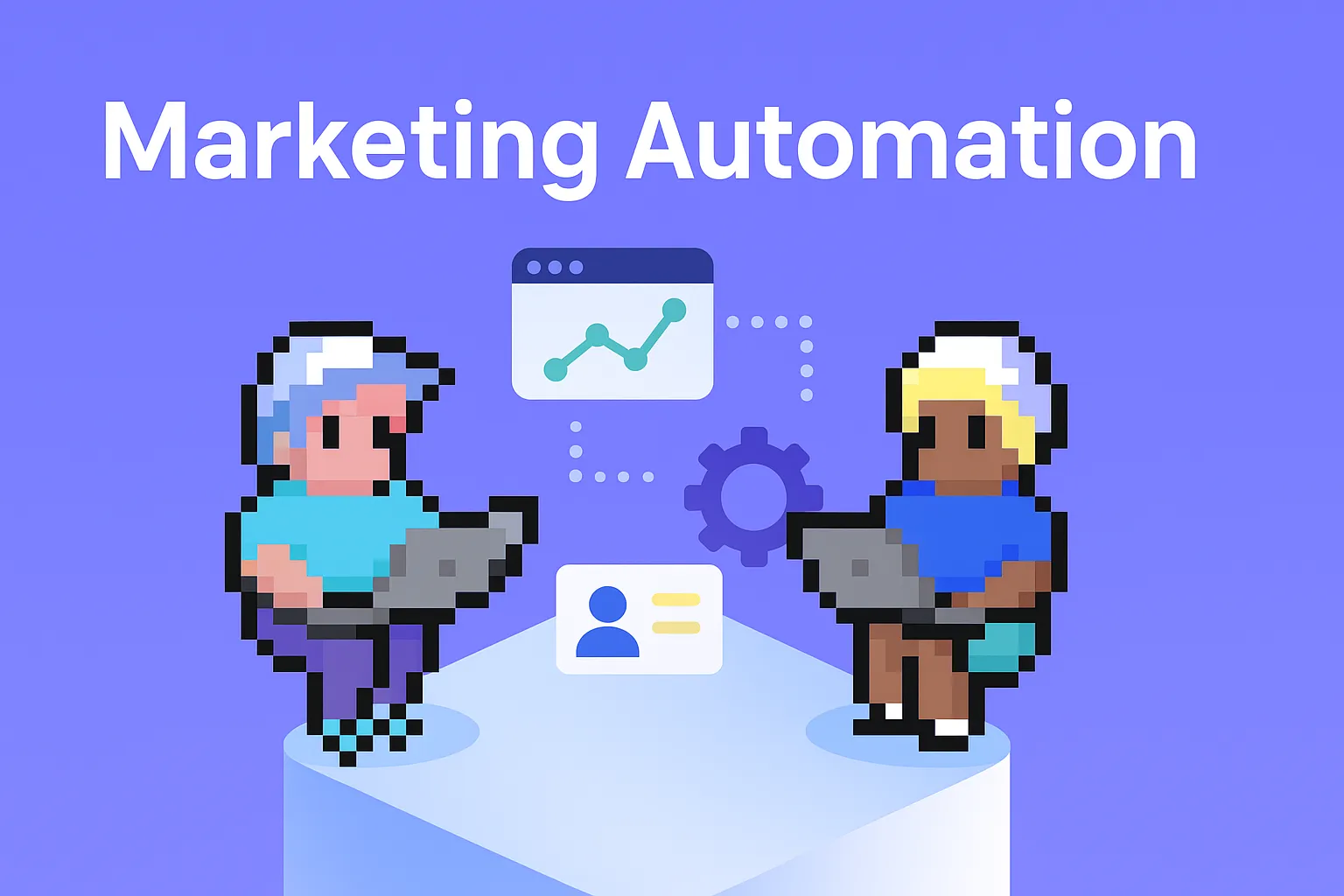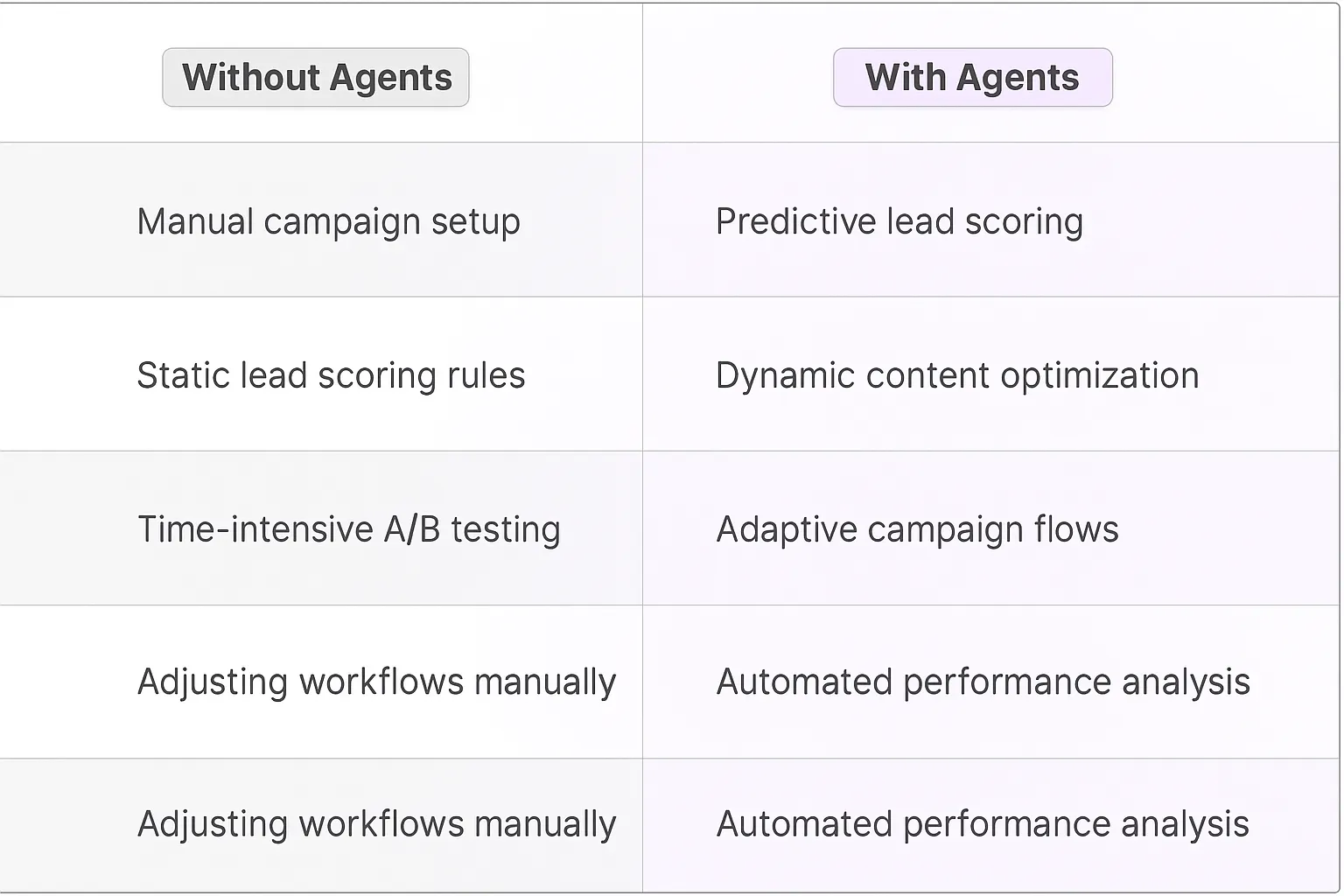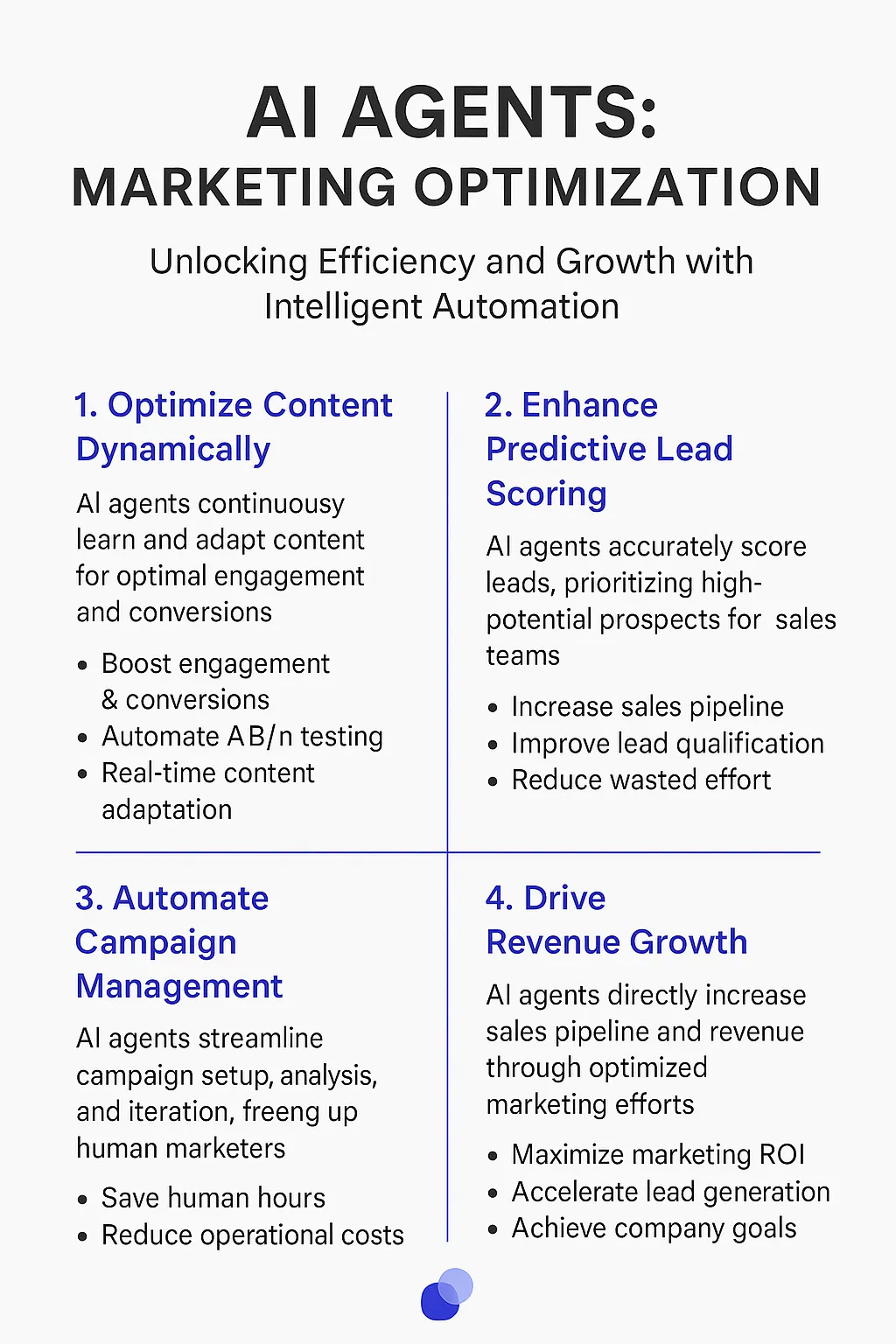Act-On
Understanding Act-On's Marketing Automation Platform
What is Act-On?
Act-On is a comprehensive marketing automation platform that enables businesses to create, manage, and optimize multi-channel marketing campaigns. The platform combines email marketing, lead management, social media marketing, and analytics tools to help companies drive engagement and measure marketing ROI effectively.
Key Features of Act-On
- Advanced email marketing and automation capabilities
- Lead scoring and management systems
- Website visitor tracking and analytics
- Landing page and form builders
- Social media marketing tools
- Marketing campaign analytics and reporting
- CRM integration capabilities

Benefits of AI Agents for Act-On
What would have been used before AI Agents?
Marketing teams traditionally relied on manual processes within Act-On to handle campaign management, lead scoring, and content creation. This meant spending countless hours crafting email sequences, analyzing engagement metrics, and adjusting marketing automation rules. Teams needed dedicated specialists just to manage the technical aspects of campaign setup and optimization.
What are the benefits of AI Agents?
AI Agents transform how marketing teams leverage Act-On's capabilities through intelligent automation and data-driven decision making. These digital teammates excel at:
- Predictive Lead Scoring: AI Agents analyze historical conversion patterns and engagement signals to automatically identify high-value prospects, eliminating guesswork from lead prioritization.
- Dynamic Content Optimization: The agents continuously test and refine email content, subject lines, and send times based on recipient behavior patterns - achieving engagement rates that manual A/B testing could never reach.
- Campaign Flow Intelligence: Rather than rigid automation rules, AI Agents adapt campaign flows in real-time based on prospect interactions, creating truly personalized journeys at scale.
- Automated Performance Analysis: Instead of manually digging through metrics, AI Agents surface actionable insights about campaign effectiveness and provide specific optimization recommendations.
- Smart List Segmentation: AI Agents identify subtle patterns in prospect data to create hyper-targeted segments that human analysts might miss, enabling more precise campaign targeting.
The real power comes from AI Agents handling the technical heavy lifting while marketers focus on strategy and creative. This creates a multiplier effect where small marketing teams can execute sophisticated, data-driven campaigns that previously required much larger teams and budgets.

Potential Use Cases of AI Agents with Act-On
Marketing Campaign Optimization
AI agents analyze campaign performance data within Act-On to identify winning patterns and suggest tactical adjustments. They monitor key metrics like open rates, click-through rates, and conversion data to recommend subject line improvements, optimal send times, and content refinements that resonate with specific audience segments.
Lead Scoring Enhancement
Digital teammates continuously evaluate lead behavior patterns and engagement signals to refine scoring models. They identify which actions truly indicate purchase intent and automatically adjust scoring weights based on conversion outcomes, creating a more precise lead qualification system.
Content Personalization at Scale
AI agents analyze subscriber interaction data to create dynamic content variations for different audience segments. They generate personalized email copy, CTAs, and landing page elements based on historical engagement patterns, industry verticals, and buyer journey stages.
Automated A/B Testing
Digital teammates manage comprehensive A/B testing programs across email campaigns, landing pages, and forms. They systematically test variables, analyze results, and implement winning variations automatically while maintaining statistical significance.
Campaign Performance Analysis
AI agents generate detailed performance reports highlighting key insights and trends across marketing initiatives. They surface unexpected correlations between campaign elements and conversion rates, enabling data-driven optimization of future campaigns.
List Segmentation Refinement
Digital teammates continuously analyze subscriber behavior and engagement patterns to suggest new segmentation opportunities. They identify micro-segments with similar characteristics and recommend targeted content strategies for each group.
Predictive Send Time Optimization
AI agents analyze individual recipient engagement patterns to determine optimal email delivery times. They track when each contact is most likely to engage with content and automatically schedule sends accordingly.
Content Gap Analysis
Digital teammates evaluate content performance across different buyer journey stages and audience segments to identify areas needing additional content development. They analyze engagement metrics to recommend specific topics and formats that resonate with target audiences.
These AI-powered capabilities transform Act-On from a marketing automation platform into an intelligent marketing partner that continuously optimizes campaign performance and drives better results through data-driven decision making.

Industry Use Cases
AI agents within Act-On transform how businesses execute their marketing campaigns and engage with customers. The integration of these digital teammates into marketing automation creates opportunities across multiple sectors, each with its own unique application and measurable impact.
Marketing teams at SaaS companies, manufacturing firms, and professional services organizations leverage Act-On's AI capabilities in distinctly different ways. While a SaaS company might focus on behavioral scoring and predictive content delivery, manufacturers often prioritize lead qualification and distribution channel optimization. Professional services firms typically emphasize relationship nurturing and personalized communication sequences.
The real power emerges when examining specific implementations across these verticals. From analyzing customer interaction patterns to orchestrating multi-touch campaigns, these AI-powered tools adapt to each industry's particular challenges and requirements. The following examples demonstrate how different sectors extract unique value from Act-On's AI capabilities.
Technology Industry: Scaling Product-Led Growth with Act-On AI
SaaS companies face a critical challenge in the current market: converting product-qualified leads (PQLs) into enterprise customers while maintaining personalized engagement at scale. Act-On AI agents transform this process by analyzing user behavior patterns across the entire customer journey.
When integrated with product analytics, Act-On AI identifies key activation moments and engagement signals that indicate enterprise-readiness. For example, when multiple users from the same organization start using advanced features or hit usage thresholds, the AI automatically triggers targeted nurture campaigns with relevant case studies and ROI calculators.
The real power emerges in how Act-On AI adapts messaging based on each organization's unique product usage patterns. A development team heavily using API integrations receives technical documentation and architecture examples, while business users see workflow templates and efficiency metrics. This granular customer segmentation drives 3-4x higher conversion rates compared to traditional marketing automation.
Beyond acquisition, Act-On AI excels at identifying expansion opportunities within existing accounts. By monitoring feature adoption rates and usage trends, it spots departments or teams that would benefit from additional licenses or premium features. The AI then orchestrates targeted campaigns to those specific groups, often resulting in 40-50% faster expansion revenue growth.
The network effects compound over time as the AI learns from successful conversion patterns across the customer base. What starts as basic automation evolves into a sophisticated growth engine that can predict which accounts are most likely to convert to enterprise, what content will resonate with each buyer persona, and when to time expansion discussions.
Education Sector: Transforming Student Recruitment with Act-On AI
Higher education institutions face intense competition for qualified students while managing limited recruitment budgets. The traditional spray-and-pray approach to student outreach simply doesn't cut it anymore. Act-On AI agents fundamentally change this dynamic by creating hyper-personalized engagement at institutional scale.
The AI analyzes thousands of prospective student interactions across websites, emails, and events to build sophisticated intent models. When a high school junior downloads multiple program brochures and visits the financial aid calculator, the system automatically adjusts their engagement strategy. Rather than generic viewbooks, they receive targeted content about their specific areas of interest, scholarship opportunities, and relevant student success stories.
What makes this particularly powerful is how Act-On AI adapts messaging based on each prospect's demonstrated preferences and behaviors. A student showing strong interest in research opportunities receives content highlighting faculty projects and lab facilities. Meanwhile, someone focused on career outcomes sees industry placement rates and alumni testimonials. This behavioral targeting typically yields 2-3x higher response rates versus traditional campaigns.
The system excels at identifying ideal timing for personal outreach from admissions counselors. By analyzing historical enrollment data patterns, the AI predicts key decision points in each prospect's journey. When multiple signals indicate high intent - like repeated campus visit page views or FAFSA submission - it triggers timely interventions from the right team members.
Most importantly, Act-On AI continuously optimizes recruitment strategies based on actual enrollment outcomes. It identifies which content sequences and touchpoints most effectively influence different student segments. This creates a feedback loop where recruitment efforts become more targeted and efficient each cycle, often reducing cost-per-enrolled-student by 30-40% while improving yield rates through customer behavior analysis.
Considerations & Challenges
Implementing AI agents within Act-On requires careful planning and strategic consideration across multiple dimensions. The integration process presents both technical hurdles and operational complexities that teams need to navigate.
Technical Challenges
Data integration forms the foundation of any AI implementation in Act-On. Marketing teams often struggle with fragmented customer data spread across CRM systems, email platforms, and analytics tools. The AI agent needs clean, unified data to deliver accurate insights and automate marketing workflows effectively.
API rate limits pose another significant technical barrier. Act-On's API infrastructure may throttle requests during high-volume periods, potentially causing delays in AI agent responses. Teams need to implement robust error handling and request queuing systems to maintain stable operations.
Custom field mapping between Act-On and AI systems requires precise configuration. Misaligned data fields can lead to broken automation workflows and incorrect personalization, damaging campaign effectiveness and customer relationships.
Operational Challenges
Marketing teams often face resistance when introducing AI agents into established workflows. Staff may worry about job security or struggle to trust AI-driven decisions, particularly for high-stakes campaigns or sensitive customer communications.
Training requirements present another hurdle. Marketing teams need to develop new skills to effectively collaborate with AI agents, understanding both their capabilities and limitations. This learning curve can temporarily decrease productivity as teams adjust to new workflows.
Governance and compliance considerations also demand attention. Teams must establish clear protocols for AI agent actions, especially regarding customer data handling and automated communication decisions. Regular audits of AI activities help ensure alignment with company policies and regulatory requirements.
Cost management requires careful planning. While AI agents can drive efficiency, teams need to monitor usage patterns and optimize configurations to prevent unnecessary API calls and processing costs. Setting up proper monitoring and alerting systems helps maintain budget control.
AI-Powered Marketing: A New Era of Automation and Scale
The integration of AI Agents with Act-On represents a fundamental shift in marketing automation capabilities. These digital teammates don't just automate tasks - they create entirely new possibilities for personalization, optimization, and scaling marketing efforts. While challenges exist in implementation, the combination of human creativity and AI-powered execution is proving to be a powerful force multiplier for marketing teams across industries. Organizations that successfully navigate this integration are seeing dramatic improvements in campaign performance, team productivity, and marketing ROI.













